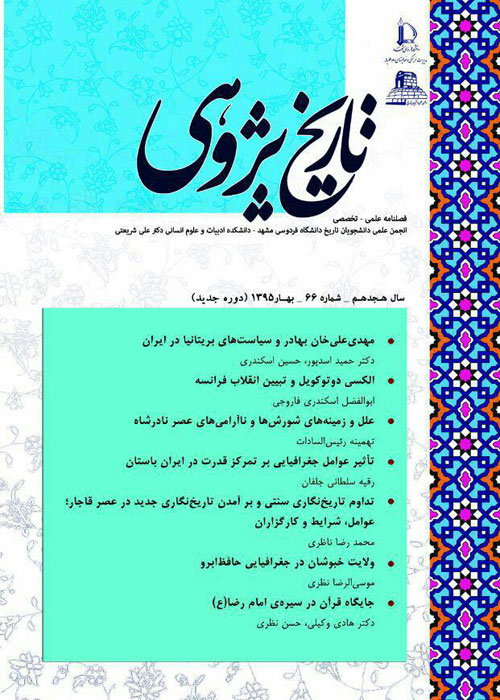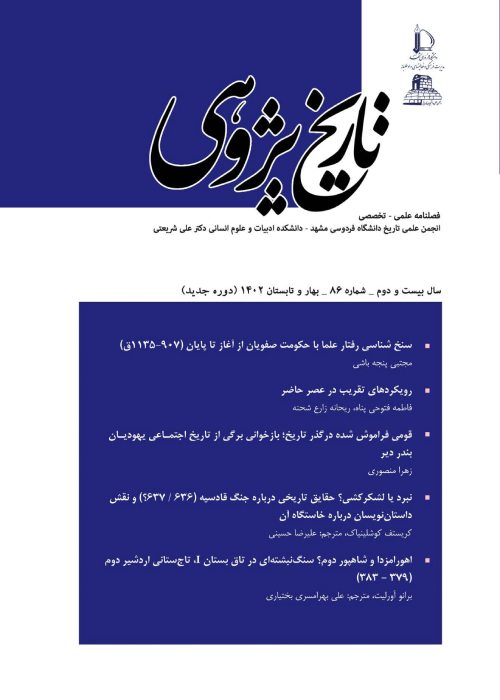فهرست مطالب

نشریه تاریخ پژوهی
پیاپی 66 (بهار 1395)
- تاریخ انتشار: 1395/03/28
- تعداد عناوین: 11
- مقالات
-
صفحه 116
-
صفحه 131
- گزارش و گفتگو
- معرفی و نقد آثار
-
Page 7Late 18th and early 19th centuries are one of the most important eras in the history of Iran and the world. Most of the world including Iran were under the effects of European colonialism and subject to their politics. Napoleons conquest, specifically in Egypt (1798), threatened Britain and its colony in India. When invasions from eastern frontiers of Iran for example by Zaman Shah reached to India, Iran as a neighbor found a crucial position in British colonialism policy. Meanwhile Russian expansionism was another treat for British India. It was in this context that Mirza Mahdi Ali Khan, EICs agent and Iranian distinguished politician, played a prominent role which has not been considered adequately. Present article investigates his role and his delegation to Fath Ali Shahs court.Keywords: Mahdi Ali Khan, Britain, India, Zaman Shah, Fath Ali Shah
-
Page 25Revolution is one of influencial events in human societies and variable nature of humans mind has been led to numerous revolutions. Many thinkers from Plato and Aristotle to contemporary scholars have tried to theorize social developments including revolutions. Among them de Tocqueville considered French revolution as a social-political phenomenon. For him revolution is a collective and multifactorial event and emphasizes on religious nature of French Revolution. Present article tries to put de Tocquevilles views and revolution theories together and analyses them in a descriptive-analytical approach.Keywords: Revolution theories, French Revolution, de Tocqueville
-
Page 47Nader Shah who is known for his expeditions and military campaigns renewed Irans power and prosperity following a decade of disorder after the Safavids fall. Using his own competencies and his efficient army, he reestablished order and security in the country even though he showed indulgence. His long and frequent military expeditions in western and southern Asia, Caucasus and Transoxiana put people in hardship and created serious political and economic difficulties for his rule and led to some revolts and disorder throughout Iran. This paper investigates the causes and backgrounds if these upheavals including taxation system, long repeatedly conquests, Irans economic problems and his religious policy through a descriptive-analytical Method.Keywords: Nader Shah, Revolt, Financial policies, Religious policy
-
Page 75Geographical elements dominated more seriously human abilities in the past. The impact of this domination could be seen obviously in different aspects of human life; even political powers were influenced with environmental factors. Present paper investigates this issue in ancient Iran through a historical methodology. Geographical extension including steppes, mountains, desserts along with population scattering and cultural diversity has led to the creation of centralization of power in a capital. In addition king has found a sacred position and consequently autocratic and untouchable state has emerged.Keywords: Geographical Diversity, Power Centralization, Ancient Iran
-
Page 95Iranian historiography had an invariability regards to its structure and content for centuries but experienced some new methodological changes in mid- Qajar period. Consequently Qajar era could be considered as the beginning of transition from classical historiography to a modern one. Present paper tries to clarify the factors, conditions and agents of this transition through a descriptive-analytical approach. Consolidation and strength of Persian prose following the Literary Restoration Movement, turning in Iranians look on themselves, their history and the world following their hard defeats in 19th century, acquaintance with European civilization and its modern historiography through translations, modern educational system (like Dar-al- Fonun) and familiarity with orientalists achievements were among the influential elements in this transition. Historians like Jala al-Din Mirza, Nazem al-Islam Kermani, Kasravi and later Abbas Eqbal and Hasan Pirnia are some of distinguished representatives of this process.Keywords: Classical Historiography, Modern Historiography, Qajar Era, Historians
-
Page 116Hafez Abru, distinguished historian of Timurid era, has considered place or more generally geographical factors as crucial elements in historical understanding and has founded kind of historical geography in 9th / 15th century. His geography is the first detailed Persian source which investigates not only major cities but also districts, country sides and villages comprehensively. As a case study this articles focus is on Hafez Abrus information about Khabushan (Quchan) district.Keywords: Hafez Abru, Geography, Khabushan, 9th, 15th century Regional Divisions
-
Page 131The era of twenty year leadership of Imam Reza is a period of the creation and expansion of different sects. Following the establishment of Bayt al-Hekmah under Harun al-Rashid and penetration of non-Moslem beliefs in Islamic society which continued at the time of Mamun, some changes appeared in Moslems understanding about the religion. During this time disagreement between rationalists and traditionalists came to its height and Mehna era started. In such circumstances Imam Reza, who was the Imam of Shiites, tried to clarify religious concepts according to Qoran. He also emphasized on Hadis along with interpretation to understand Qoran and in the case of difference the role of rationale would be considerable. Consequently expressions of Qoranic verses could be find everywhere in Imams theoretical and actual Sirah. This paper investigates this issue through a descriptive-analytical approach considering original historical and traditionary sources.Keywords: Imam Reza, Qoran, sirah, Hadith


